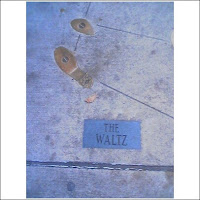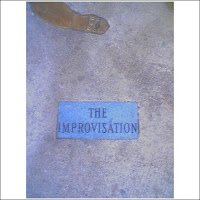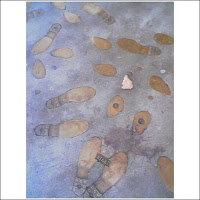If you walk up Frazier Ave. between the bridges in Chattanooga’s North Shore neighborhood, you come across sidewalk sculpture like this:

Every so often, for three or four blocks, there is another dance instruction: the Waltz, the Cha-cha, the Mambo. I, of course, danced my way up the street by the time I came to the final installation:
As much fun as it was to jump around on the sidewalk, trying to follow the brass footprints, I wasn’t improvising. There’s more – much more – to improv than just doing the first thing that comes to mind or just going crazy on the street. A good improvisationalist spends a great deal of time and effort preparing.
Soon after I started writing this blog, I connected with Mark Heybo, who lives in England. He wrote a post about a group called Improv Everywhere whose mission is to create scenes of “joy and chaos” whenever they can. My favorite was an event they planned that required large groups of people, back packs, and cell phones. Three different groups of people entered a museum, one at a time, and checked their back packs as they went in, leaving their cell phones (with specific ring tones) on and in the bag. Once everyone was in the museum, three other groups of people began to dial the numbers in a very calculated fashion to create a sort of coat check symphony. Whether you see the event as creative or simply annoying to the folks who checked the bags, my point is their improvisation took a lot of planning and preparation, not to mention participation.
I could hear the ring tones as I read these words from Samuel Wells:
Ethics cannot be simply about rehearsing and repeating the same script and story over and over again, albeit on a fresh stage with new players. This does not do sufficient justice to the unfolding newness of each moment of creation. The Bible is not so much a script that the church learns and performs as it is a training school that shapes the habits and practices of a community. This community learns to take the right things for granted, and on the basis of this faithfulness, it trusts itself to improvise within its tradition. Improvisation means a community formed in the right habits trusting itself to embody its tradition in new and often challenging circumstances; and this is exactly what the church is called to do. (12)
As I was driving this morning, I heard the last bit of commentary after President Bush’s press conference today. He was talking about the new intelligence report that basically says Iran is not as dangerous as he — and others — have been saying, even intimating that “World War Three” is imminent. His response to the news was to say our foreign policy as related to Iran will not change. We’re going to keep acting, it seems, as though the old information were reliable, which means we will continue to be motivated by fear. I don’t know if he doesn’t know how to change, or if he doesn’t want to, or what is behind his recalcitrance, but he serves as a good example of what improvisation doesn’t look like.
The world is changing faster than we can understand. (I’ll bet you didn’t know that!) I live in Durham, North Carolina. Down the street from my house there is a small eight-shop strip center that is home to a Thai restaurant, an Indian grocery, an African grocery, a Chinese cooking school, and a Mediterranean delicatessen. I’m not in New York or London; I’m in Durham. I love it. And it means I’m compelled to think about life in America in new ways and do more than lament that the days of everyone looking and acting like me are over. As Steve Earle sings on his new album:
living in a city of immigrants
I don’t have to go traveling
open the door and the world walks in
living in a city of immigrants
When I lived in Dallas, there used to be a billboard on Central Expressway that someone with a sense of humor used to post pithy sayings. One of my favorites was
If you’re getting run out of town, make it look like a parade.
Such is the heart of improvisation. Wells begins his book talking about the church in its beginning years as a community of integrity, identity, and imagination:
The early church believed that its own fragile and vulnerable state was deceptive . . . They demonstrated this faith by maintaining nonviolence, the practice of confronting evil using only the weapons that Christ himself used. The early Christians also believed that they were a distinct people with a special vocation. Their form of life was dictated by no criterion other than faithfulness to Christ. Their identity was expressed in baptism. They believed their common life and servant practice were the heart of the gospel. They believed their calling was to show what kind of life was possible when communities lived in the light of God’s providence and they embodied this faith in their celebration of the Eucharist. (24-25)
They knew they weren’t in charge, or even safe, so they lived as if that was they way they intended it to be, incarnating in their own lives what they had seen in Jesus, which meant understanding authentic discipleship rarely draws rave reviews from those at the top of the heap. The “virtue” of their fellowship, as Wells describes it, finds its echo in Martin Luther King, Jr.’s words about the faithful trusting that “right defeated is stronger than evil triumphant.”
Yesterday was our first Sunday at our new church and it was also the first Sunday of Advent and Communion Sunday. I also learned, as the children gathered at the front of the church with Carla, our associate pastor, that it was “Pennies for Hunger” day, which meant the children enthusiastically took baskets out among the congregation to collect our “pennies” for local hunger concerns. I loved the ease and comfort with which the kids moved around the sanctuary, as though it was a place they belonged – even when one of them dropped his basket of change on the floor. Someone helped him pick it up and everything was fine. I thought about the kids this morning when I read this post at Mr. Jones and Me:
Last year I met a tiny girl of three named Maeve. She was putting the final touches on an incredible sort of cabinet that was half-drawn with coloured crayons, yet some of the tiny drawers in it undid and pulled out; it was definitely magical.
I asked the child how she did it, and she grinned at me and said in a whisper, “It’s not that difficult to be magical. Do try to keep up!”
I’ve never forgotten she said that.
The folks at Pilgrim light the Advent candle at the end of the service rather than the beginning, which is a change in what I am used to. As one of the young people lighted the candle, we sang, “Peace, peace, peace,” as if it were as capable of being realized as being magical was to Maeve. She had the eye, the heart, and the vocabulary to see a world full of magic; what is our language of the heart?
Virtues are derived from repeated practices that a community continually performs because it regards them as central to its identity. Repeated practices nurture skill, an excellence that derives from repeated performance. Skill develops habit, a disposition to use skills on occasions and in locations different from the times and places where the skill was developed. Habit develops instinct, a pattern of unconscious behavior that recalls a deep element of character. This is the language of virtue. (Wells 24)
Advent is a season that calls us to rearticulate our calling, to remind ourselves to prepare and practice, to remember the body of Christ that we might be born again, afresh into a world that has long since lost sight of magic, or purpose, of peace. We are not merely waiting; we are getting ready.
Maeve’s words are prophetic: do try and keep up.
Peace,
Milton


Love that you’re in Durham. (I’m from Chapel Hill.) Hope the NC life is going well.
Yes, life is different than it once was – and I like it. Not liking the fact that our president is so out of touch.
There are so many people around me who are, like our president, seemingly driven by fear. I grow more and more certain that part of our calling to genuine discipleship is a steadfast willingness to live in such a way that gently, but truthfully, exposes that fear and, in time, replaces it with hope. Is that hope worth waiting for, worth “getting ready?” I think so.
Ya know, everywhere I turn I’m faced with the concept of Christian practices. I’m trying to keep up.
Later-Tom
Someone once asked George Steinbrenner, owner of the New York Yankees baseball club, why he pushed so hard to win. He said, “This is New York; you have to keep up.”
Cool, Ginger is already on the staff page.